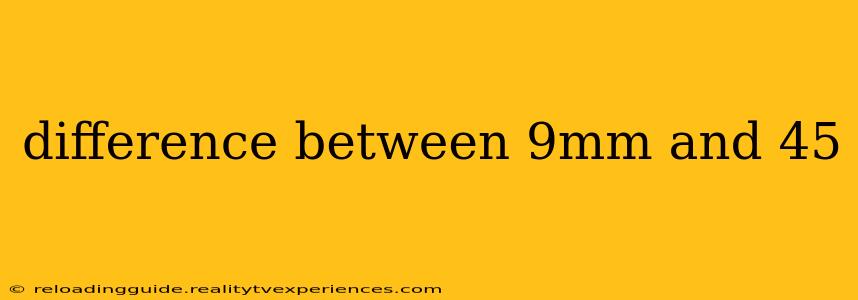Choosing between a 9mm and a .45 ACP handgun is a common dilemma for both experienced shooters and newcomers alike. Both calibers boast a long history and loyal followings, but understanding their key differences is crucial for making an informed decision. This detailed comparison explores the ballistic performance, recoil characteristics, capacity, and overall suitability of each caliber.
Ballistic Performance: Power and Penetration
The most significant difference lies in their ballistic performance. The .45 ACP, with its larger diameter bullet (.452 inches) and heavier weight, delivers significantly more stopping power at close range. This greater mass translates to a larger wound cavity, potentially causing more immediate incapacitation. However, this increased power comes at a cost.
Penetration and Expansion:
- .45 ACP: Known for its substantial mass and energy transfer, the .45 ACP often exhibits impressive penetration, particularly with full metal jacket (FMJ) rounds. However, expansion can be less reliable than with some 9mm designs, depending on the ammunition used.
- 9mm: The 9mm Parabellum, while less powerful in terms of raw energy, can achieve superior penetration and expansion with modern jacketed hollow point (JHP) ammunition. JHP rounds are designed to expand upon impact, creating a larger wound cavity and transferring more energy to the target.
Recoil and Shootability
Recoil is another crucial factor influencing shooter preference.
Recoil Management:
- .45 ACP: The .45 ACP generally has noticeably more recoil than the 9mm, making it less forgiving for new shooters or those with smaller builds. This stronger recoil can also impact follow-up shot accuracy.
- 9mm: The lighter recoil of the 9mm allows for faster target reacquisition and improved accuracy during rapid fire. This makes it a popular choice for self-defense, law enforcement, and competitive shooting.
Capacity and Magazine Size
Magazine capacity significantly impacts the number of rounds available before a reload is necessary.
Magazine Considerations:
- .45 ACP: .45 ACP magazines generally hold fewer rounds compared to 9mm magazines. This limited capacity can be a significant drawback in self-defense situations where multiple threats may be present.
- 9mm: 9mm handguns typically offer higher magazine capacities, providing more rounds available before needing a reload.
Cost and Ammunition Availability
The cost of ammunition and its availability are important considerations for any firearm owner.
Cost Comparison:
- .45 ACP: .45 ACP ammunition can be slightly more expensive than 9mm, particularly for premium self-defense rounds.
- 9mm: 9mm ammunition is generally more readily available and more affordable than .45 ACP, making it a more economical choice for regular practice and training.
Conclusion: Which Caliber is Right for You?
The "better" caliber depends entirely on individual needs and preferences. The .45 ACP's greater stopping power is attractive for self-defense, but its stronger recoil and lower capacity require more training and practice to manage effectively. The 9mm's lower recoil, higher capacity, and affordability make it a versatile and practical choice for a wide range of applications.
Ultimately, the best way to determine which caliber suits you best is to rent or borrow both and experience them firsthand at a reputable shooting range. Consider your physical capabilities, intended use (self-defense, sport shooting, etc.), and budget when making your decision. Remember to always prioritize safe handling and responsible gun ownership.

